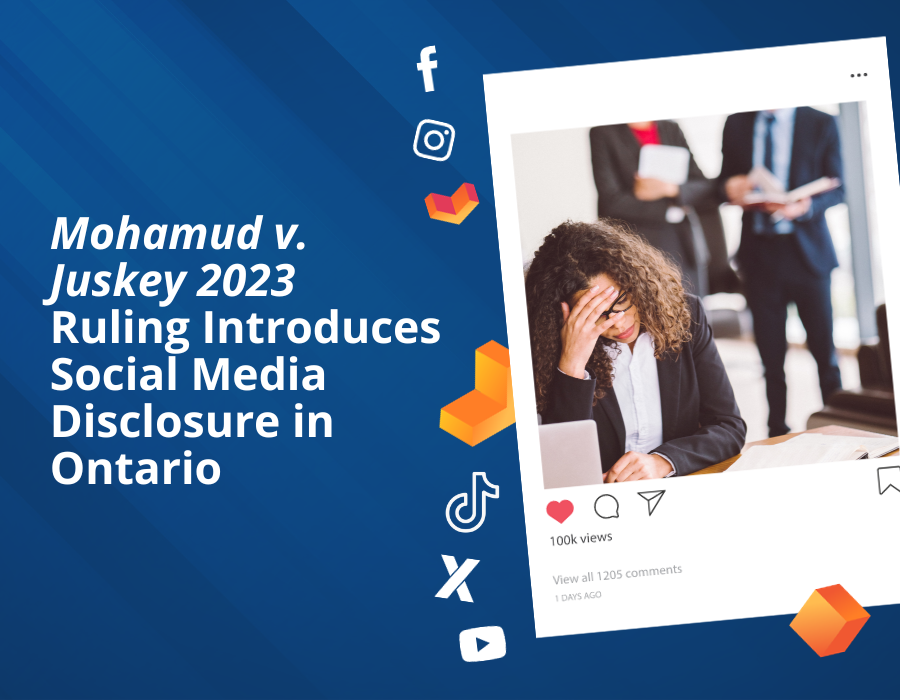
Lessons from Trillium v. Ontario
The Ontario Court of Appeal’s decision in Trillium Power Wind Corporation v. Ontario emphasized the severe repercussions of evidence destruction.
The Ontario government’s intentional destruction of relevant emails and electronic documents, especially after becoming aware of litigation, led to a finding of spoliation in this case. The destruction was timed suspiciously close to the moratorium that halted Trillium’s wind farm project, and the evidence revealed systematic destruction of emails and phone records.
The court’s ruling in favor of Trillium highlighted the necessity for transparent and strict record-keeping, especially in digital formats.
Insights from Mohamud v. Juskey
Justice C. Boswell’s decision to require the plaintiff to disclose relevant posts clarified the importance of balancing client privacy and the need for accurate information.
In Mohamud v. Juskey, the Ontario Superior Court considered the discoverability and relevance of social media content. The plaintiff resisted providing her social media data to the defendants, citing privacy concerns.
Justice C. Boswell noted that social media content must meet the relevance test, with the probative value balanced against the prejudice to the plaintiff. Despite objection from the plaintiff and her counsel, the court ordered the plaintiff to disclose her private social media content, but limited the scope to relevant posts and photographs which depicted activities that related to her claim for damages due to injuries from a motor vehicle accident.
What This Means for Lawyers Advising Clients About Their Social Media Posts
Both Ontario cases contain relevant information that can be shared and utilized across several different types of law.
- Preserve All Digital Evidence: The intentional destruction of digital evidence can lead to adverse inferences and penalties. Advising clients to maintain all relevant social media content is crucial to prevent accusations of spoliation. What this also means is lawyers are best served to know the full extent of what their clients have posted and continue to post, either manually, or using automated tools such as Private Footprint.
- Understand the Privacy Balance: While social media is a valuable source of evidence, courts recognize privacy interests. Lawyers should ensure that clients only produce relevant content for their case and be prepared to argue for or against its disclosure in court.
- Early Legal Guidance is Crucial: Assume the other side has already seen a plaintiff’s social media content. Engaging with clients early in litigation helps set the tone for record preservation and management. Proper advice on preserving electronic evidence can mitigate the risk of spoliation claims.
- Tailor Discovery Requests Appropriately: When seeking social media evidence, it’s essential to be precise and limit the scope to only the necessary content. Broad requests or fishing for information will likely not pass judicial scrutiny.
Meeting the Standard of Care for Client’s Social Media Evidence
As legal professionals, meeting the standard of care is crucial when advising clients on social media evidence. The recent decisions in Trillium v. Ontario and Mohamud v. Juskey highlight the importance of carefully managing digital evidence to meet legal obligations. Here are essential considerations for lawyers to ensure they meet this new standard of care:
- Educate Clients on Legal Obligations: Lawyers must proactively educate their clients on the importance of preserving social media evidence. This includes guiding clients to avoid altering or deleting any posts that could be relevant to their case.
- Implement Comprehensive Discovery Protocols: Establish detailed protocols for collecting and reviewing social media data. This involves understanding the different privacy settings and working with clients to ensure all relevant information is available while respecting their privacy.
- Develop a Clear Litigation Hold Process: Implement a litigation hold process that includes social media. This process should communicate to clients the importance of preserving all digital content related to the litigation.
- Advise Clients on Privacy and Disclosure: Counsel clients on the privacy implications of sharing social media content in litigation. Help them understand the court’s balancing act between relevance and privacy.
- Stay Updated with Jurisprudence and Best Practices: Regularly review legal standards and best practices to stay updated on the evolving jurisprudence surrounding social media evidence. This ensures that the advice given to clients aligns with the latest legal developments.
- Utilize an Organized Platform for Client Social Media Evidence Management: Given the volume of clients and the vast amount of social media data, it’s essential to use a platform like Private Footprint that allows for the efficient collection, review, management, and production of social media evidence. This will ensure a structured approach to handling evidence and meeting deadlines.
By incorporating these considerations into their practice, lawyers can effectively navigate the complexities of social media evidence and ensure they meet the standard of care in advising clients.
Private Footprint is the solution for collecting, reviewing and managing social media evidence effectively. With its intuitive tools and organized dashboard, you can streamline your social media evidence management process, maintain standard of care, and build reports with ease. By implementing Private Footprint in your operations, you ensure a structured approach to client social media evidence handling, allowing your team to focus on delivering the best outcomes for your clients.
Don’t let the challenges of client social media evidence overwhelm you—empower your practice with Private Footprint. Get your free demo today!





























